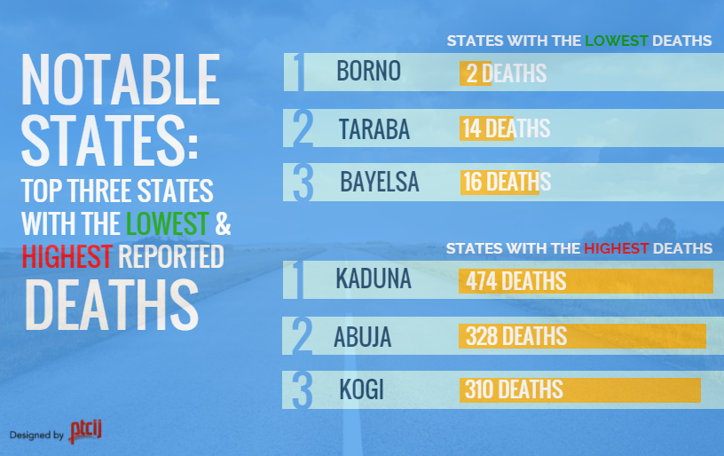
An average of 15 people died daily in road accidents across Nigeria in 2015, official statistics show.
The report by the Federal Road Safety Corps shows that 5,440 Nigerians lost their lives in road accidents across the country in 2015.
The figures revealed a reduction of 1,010 from the 6,450 in 2013.
The report also found that a total of 30,478 Nigerians sustained varied degrees of injury, marking an improvement of 9,579 over the 40,057 recorded in 2013.
The latest data come at a time when the FRSC is intensifying enforcement of road traffic rules and enforcing standards of automobile peripherals.
The Corps Marshal of the FRSC, Boboye Oyeyemi, credited improved training and equipment of traffic officers across the country for the improvement.
Mr. Oyeyemi said he remained optimistic that the speed-limiting devices in commercial vehicles would drastically reduce crashes on Nigerian roads when it is eventually introduced on October 1.
WORST AFFECTED STATES
The report showed that Kaduna State had the highest number of road traffic deaths with 474 confirmed cases.
The Federal Capital Territory, FCT, Abuja, suffered 328 deaths due to road accidents while Kogi State came third with a total of 310 losses.
Borno, Taraba and Bayelsa States recorded the least number of deaths with 2, 14 and 16, respectively.
In the breakdown of injured motorists for 2015, Abuja also featured prominently, recording up to 2820 cases.
Nasarawa came second with 2069 injuries while Kaduna resurfaced at number three with 2025 injured persons.
With a reported 55 cases, Borno State again recorded the lowest number of injured persons in 2015. Akwa Ibom and Bayelsa States came second and third, where the commission said it recorded 95 and 130 cases, respectively.
The FRSC has attributed the crashes chiefly to over-speeding, and said it would not back down on the October 1 deadline for the enforcement of the devices in commercial vehicles.
“We already have the portal that we will use to monitor this, we don’t need to pursue any vehicle, we will just stop you like we verify licence,” Mr. Oyeyemi said.
“On the tablet we will check whether your vehicle has been installed with the device, if it has not, we will impound the vehicle and we make sure that you do the right thing,” he added of the device whose enforcement is expected to commence with commercial vehicles before private vehicles.
PREMIUM TIMES findings, however, showed that there are other critical factors responsible for road accidents which cannot be addressed by simply installing speed-limiting devices in automobiles.
Human, mechanical and environmental factors play respective roles in the road safety matters.
END

Be the first to comment